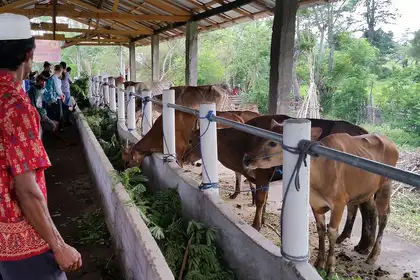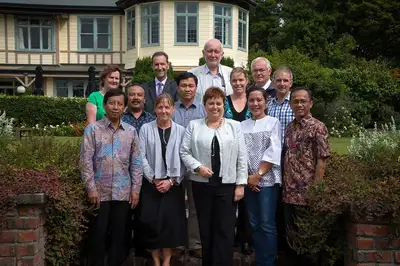
Helping Indonesian farmers in country.
When Kiwis think farming, they picture wide-open spaces and a land of opportunity, but across the world in Indonesia the space is scarce and the opportunities are hard won.
Five academics from the University of Mataram in East Indonesia visited Massey University last month to see how New Zealand expertise can marry with education programmes in Indonesia to aid farmers on the ground as part of a multinational farming project between the two universities.
Associate Professor Chris Anderson of Massey's Institute of Agriculture and Environment says the trip is focused on building capability within the University of Mataram to lead on-going agricultural development in Indonesia.
“This programme is about building capability within Indonesia for the University of Mataram to transfer knowledge that will serve these farmers to farm smarter and ultimately lead better lives. A New Zealand Farmer decides how to manage production by looking at the maximum output they can get without detrimental effects on future output of that farm. Using a variety of tools at their disposal, they would find a level that meets this year’s optimum without harming future production.
“An Indonesia farmer often doesn’t have the luxury of thinking about next year or have the tools to be efficient, and may overwork the land just to produce enough food to feed their family through the dry season – only to suffer the after effects of such an aggressive farming method in the future.”
The week focused on four key areas: feeding, parasites, breeding and farmer education, which were explored through discussion groups and practical visits to sites like Massey’s Tuapaka Farm, the meat laboratory, as well as visits to local farms, farming stores, stockyards and farmers markets.
“We are learning much from our colleagues in Mataram and I hope they are getting as much from it as we are,” Associate Professor Anderson says. “At times the work is challenging as we operate within two different worlds, but the work we are doing together is using the knowledge of both universities to develop the best strategy to improve animal breeding, nutrition and animal health that can be rolled out within poor farming communities where it is going to do a lot of good.”

(left) Dr Penny Back, Dr Dahlanuddin, Dr Nonong Tanaya, Professor Ray Geor, Dr Janet Reid, Dr Ahmed Zaenuri, Vice-Chancellor Professor Jan Thomas, Professor Bill Pomroy, Associate Professor Rebecca Hickson, Dr Made Sriasih, Professor Steve Morris, Associate Professor Chris Anderson and Mr Oscar Yanuarianto.
Applying knowledge
Mataram will use the information gathered on this trip to train field officers and extension staff to go out and deliver programmes in animal health, breeding, and nutrition for cattle farmers. For example, breeding and nutrition programmes that could be rolled to increase rates of cattle live-weight gains, and increase calf numbers.
“The programmes we are working on for them to take back to Indonesia aren’t New Zealand best-practice models, but tools and technologies for innovation that will enhance and support the existing farming systems. We want the Indonesians to develop best-practice models that are relevant to their cultural, social and environmental issues,” says Associate Professor Anderson.
“The best way to reach the best outcome is to devise what will work together through discussion – utilising the resources at hand for the most good that will actually work when rolled out back in Indonesia. Even further than that, what we are doing here could become best-practice models for similar programmes across East Asia.”
Mataram University's Dr Dahlanuddin said that the work between them is actively making a difference to farmer’s lives.
“We operate and our farmers operate in a different system to New Zealand – different cattle, different society and different environment. For example, one cattle to one hectare of land would be a luxury in Indonesia for most of these farmers as there are limited resources, so we use what we have.
“The most interesting and useful information has come from the specific centres like how breeders operate here and how they manage the selling part of the business. Cattle are produced in a comprehensive way where they are managed throughout the value chain, not just breeding and feeding, but guidelines on how to look after them at every stage so they can retain and maximise value.
“A lot of the Massey team have experience working in Indonesia so they know the culture and the conditions, which makes it far easier to communicate on common ground. The aim is to improve the capacity of research, facilities and communicating with farmers and policy makers so problems can be solved locally through national programmes.
“It's time to take these learning home - that’s how you achieve a higher production, the best product and the safest product – we want to share this knowledge,” Dr Dahlanuddin says.
The group visited the Manawatu campus from February 26 to March 8. The other members of the Mataram group include Dr Ahmed Zaenuri, Mr Oscar Yanuarianto, Dr Made Sriasih and Dr Nonong Tanaya.
The team has now returned to Indonesia and start writing procedures and guideline documents with the aim of training field staff in Agribusiness Support Centres in Dompu and North Lombok. These centres, staffed by a manager and project field officers collect project data, monitor and evaluate results, and inform agricultural policy based upon structures set in place by Mataram.
About the project
The East Indonesia Innovative Farm Systems and Capability for Agribusiness Activity (IFSCA) is four year, $4.2million agricultural development project awarded to Massey University by the Ministry of Foreign Affairs and Trade, in partnership with the University of Mataram in Indonesia.
Located in the east Indonesia province of Nusa Teggara Barat, the project is working in Dompu on the island of Sumbawa with corn and cattle farmers; and North Lombok on the island of Lombok with growers of fresh fruit and vegetables.